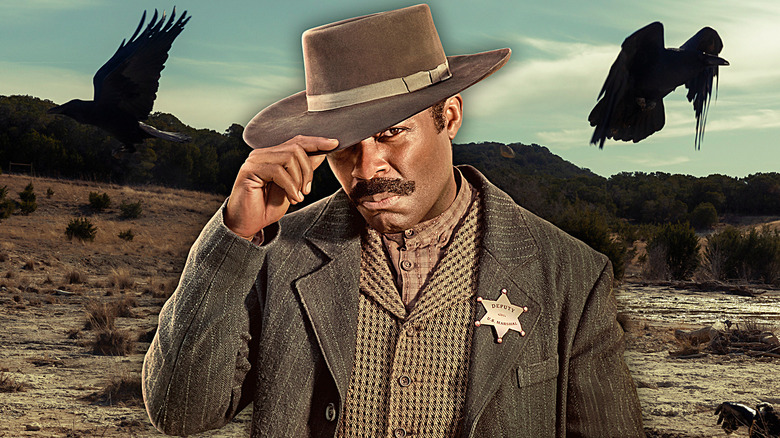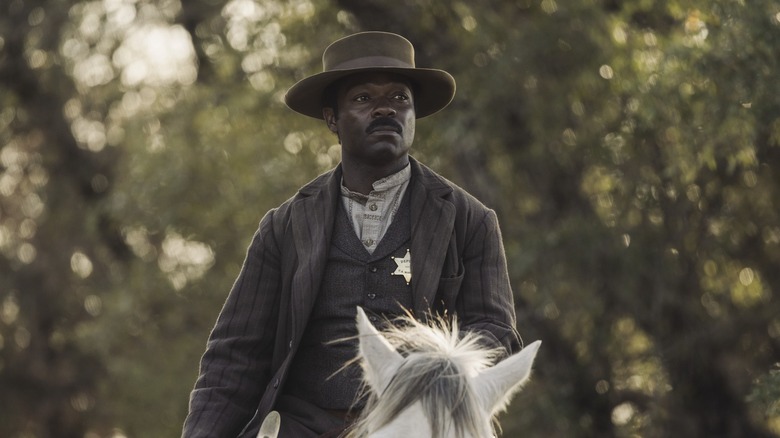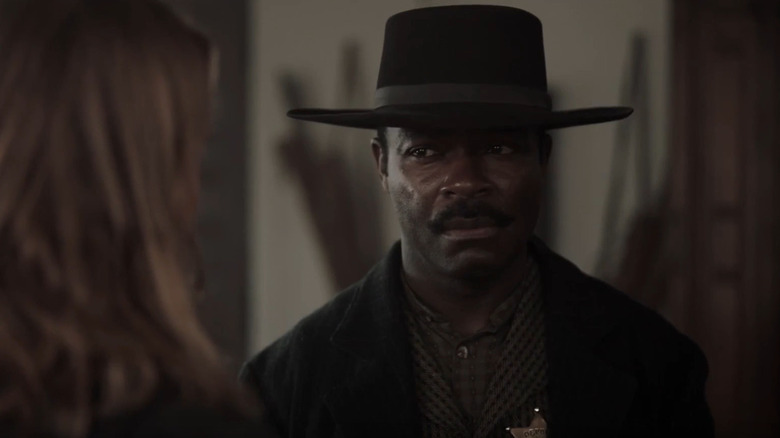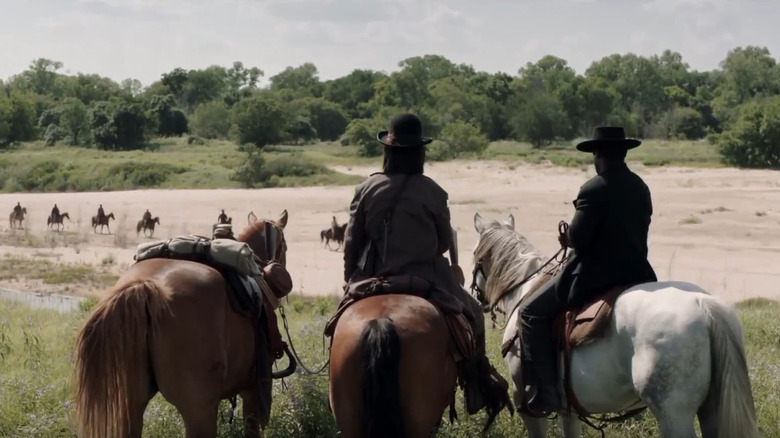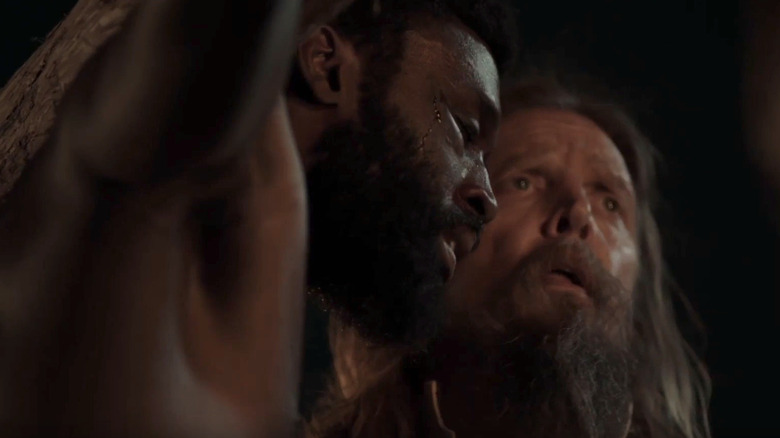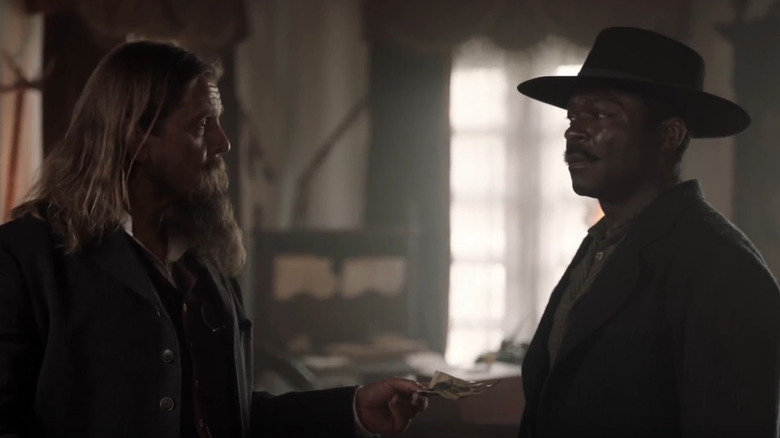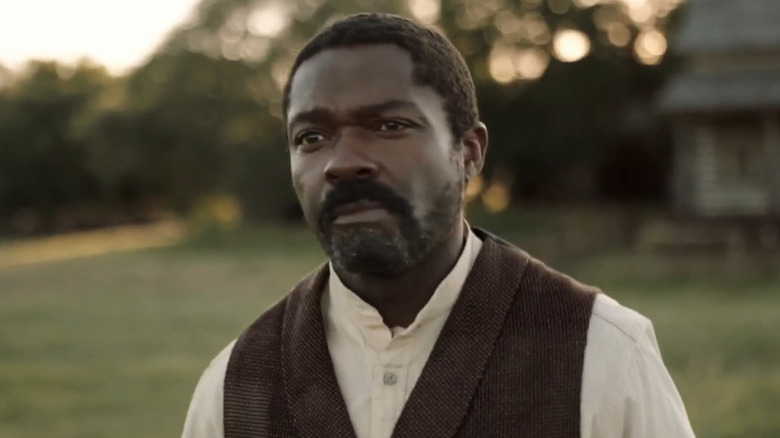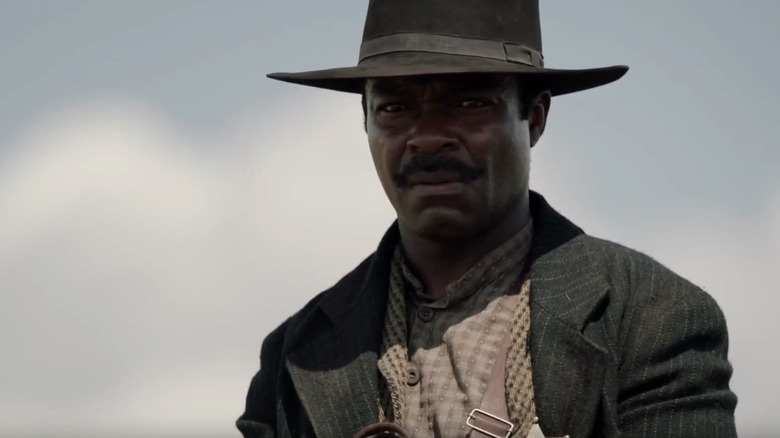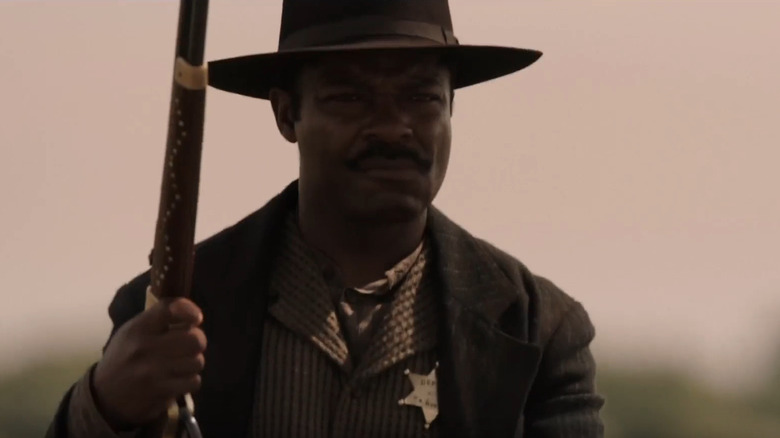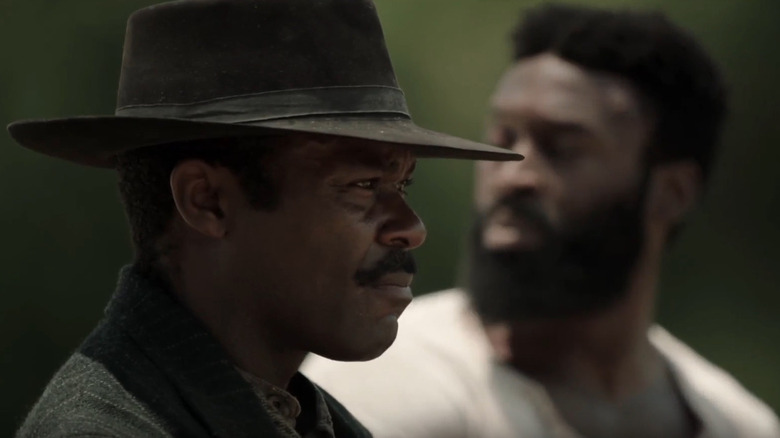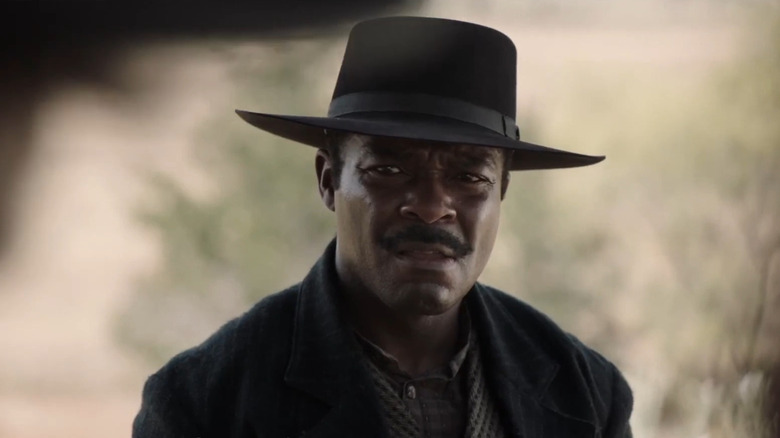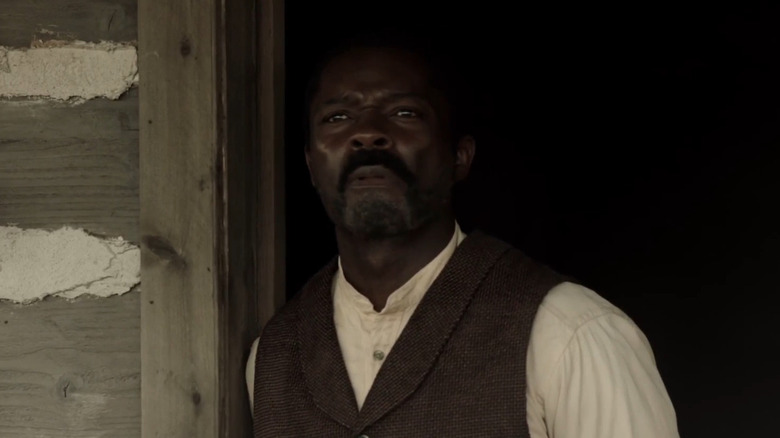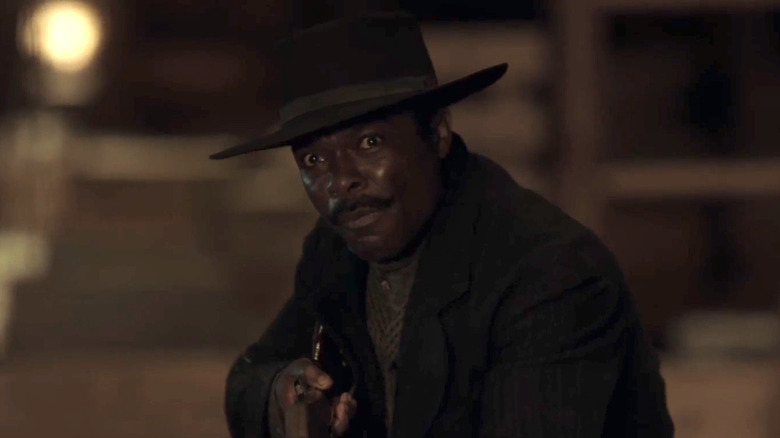The Ending Of Lawmen: Bass Reeves Explained
Contains spoilers for "Lawmen: Bass Reeves"
Writer-director Taylor Sheridan can do no wrong these days, between "Yellowstone," "Lioness," and "Tulsa King." In 2023, though, it was a new creative team taking the lead in a Sheridan-produced series, the Western drama "Lawmen: Bass Reeves." Created by writer Chad Feehan and starring David Oyelowo (who also served as co-producer), "Bass Reeves" tells the true story of America's first Black U.S. Marshal.
Born into slavery, Reeves escaped to freedom during the Civil War, eventually starting a family after the Union declared victory and abolition became the law of the land. Not long after, Reeves began assisting the law in hunting fugitives, eventually getting a badge himself before establishing himself as one of the greatest lawmen of the era. "Lawmen: Bass Reeves" explores this time of his life, when he is forced to grapple with racism even as he serves his country hunting down the worst criminals in the Wild West.
With a focus on Reeves' journey from enslavement to folk hero, the series explores Reconstruction, when freed slaves were still trying to find a place for themselves in post-war America. While Reeves tracks down dangerous bandits and hardened killers — including a man he has a personal vendetta against — his biggest conflict may be his fight for a better future. Does he get it? Find out now, because this is the ending of "Lawmen: Bass Reeves" explained.
What you need to remember about the plot of Lawmen: Bass Reeves
"Lawmen: Bass Reeves" shows the early days of the future famed gunslinger, the property of Confederate Col. George Reeves. Forced to fight for the South under his owner's command, Reeves distinguished himself for his bravery and marksmanship but had moral qualms about battling the Union, who were attempting to end the practice of slavery nationwide. After a bitter battlefield defeat, though, Reeves beat his owner half to death — forcing him to go on the run and leave his wife behind.
While hiding out in Indian Territory, Reeves became well-acquainted with the Indigenous people, learning their language and becoming a quasi-father to a young Native American boy. But after learning that the war is over — and his people are free — Bass encounters escaped Confederate prisoner Esau Pierce (Barry Pepper), who murders his surrogate son. Soon, a local Marshal named Sherrill Lynn (Dennis Quaid) recognizes Reeves' skills and familiarity with the Indian Territory and recruits him as a Marshal himself.
Now, together with a Native American ally named Billy Crow — a former outlaw turned do-gooder — Reeves sets out to bring justice to the Wild West. Along the way, he hears rumors of a mysterious menace called Mr. Sundown, who may be responsible for the disappearance of newly freed Black slaves.
What happened at the end of Lawmen: Bass Reeves
One of Bass Reeves' bounties is Jackson Cole, a former slave who murdered his owner and set fire to his plantation. When he apprehends Cole, though, Reeves faces a crisis of conscience knowing he is guilty of similar crimes, and yet now wears a badge. Things get worse when his duty requires him to hand Cole over to a Texas Ranger who turns out to be none other than Esau Pierce — who since his encounter with Reeves years earlier has become a lawman himself.
When he returns home to collect his reward for delivering Cole to Pierce, Reeves learns that Pierce never handed Cole over to the courts for trial, claiming instead that the former slave was killed while in pursuit. Reeves soon realizes that Pierce may be the purported Mr. Sundown. Looking to go after Pierce for the cold-blooded murder of his bounties — and more personally for the killing of his surrogate son years earlier — Reeves enlists Crow and fellow marshal Lynn in a daring and unthinkable mission to take down a fellow lawman.
Reeves learns that Pierce has been abducting former slaves on his bounty, telling the courts they are dead, and using them as slave labor in a vast operation that has made him a wealthy man. After a guns-blazing confrontation that gets Lynn killed, Reeves has his showdown with Pierce and comes out victorious, getting the revenge he's been searching for.
Sometimes there are happy endings
Unlike so many famous Westerns that end with one or more of their heroes dead or dying — including sister series "1883" — "Lawmen: Bass Reeves" flips the script and features a happy ending for its titular star. As the episode draws to a close, Bass Reeves returns to his home where his wife and children are waiting for him. His family had faced racist taunts from white neighbors, and even a taunting visit from their former owner's wife, but now they stand tall as heroes of the West.
And it's not just Reeves and his family who get a poignant, upbeat conclusion. After killing Pierce, Reeves sets his group of kidnapped slaves free — Jackson Cole leads them, and Reeves gifts them with a sack of Pierce's cash to help them start a new life. Billy Crow, meanwhile, is given a large diamond recovered from Pierce's treasures, which he plans to use to finally win the hand of Calista, the woman he loves. While Marshal Lynn was killed in the shootout with Pierce and his men, Reeves and the heroes of "Lawmen" get the ending they deserve, riding off into the sunset having brought justice to a lawless land and secured a better future for themselves and those in need.
What the ending of Lawmen: Bass Reeves means
Throughout "Lawmen: Bass Reeves," two stories are playing out that parallel each other. First is the story of U.S. Marshal Reeves and his fight against the outlaws of the West, as he faces the struggle of being a former slave tasked with bringing in his own people who often committed crimes out of sheer desperation. But alongside that tale is that of Reeves' wife Jennie, and a local pastor's pursuit of the family to join them in their quest to create a new land for freed Black men and women to live in peace.
In both stories, themes of redemption and justice are prevalent, but what those mean to each of them isn't always the same. While Reeves hopes to become a true equal to his fellow White marshals, earning their respect through his tenacity and prowess on the job, Jennie and her old friend Esme must decide if justice lies elsewhere — in a land they will call their own. But while Reeves later faces a trial of his own for the death of his posse cook, and Jennie realizes she's being used by the pastor for her husband's fame to elevate their cause, they each find themselves at a crossroads, which is the crux of the story's conclusion. Ultimately, both realize that for justice to be done, they can't run away from the struggle that stands in front of them.
How the morals of the Wild West were upended in Lawmen: Bass Reeves
The Western genre typically includes a few key elements, from the daring gunslinger to the insidious villain. But one of its most important is the ethically dubious hero who must often bend the moral code to see justice done. At its most extreme, some Westerns even feature a morally grey lawman, bounty hunter, or cowboy who is nearly a villain themselves in their quest to bring peace to the chaos of the Wild West. But "Lawmen: Bass Reeves" subverts this trope entirely.
From the beginning through to its very end, U.S. Marshall Bass Reeves isn't a man willing to break the rules to ensure that criminals pay for their misdeeds. With a strict moral compass, Reeves is the rare Western hero who doesn't even enjoy using a gun, no matter how good a sharpshooter he may be. Dead set on delivering his bounties alive, he'll go to great lengths to avoid bloodshed, and rather than go on a rogue mission to kill his nemesis Esau Pierce, he sets out with another U.S. Marshal to arrest him and bring him to trial — even if it doesn't quite go to plan.
But the most striking moral quandary that Reeves faces is the realization that his own story is a mirror to that of Jackson Cole, the bounty he delivers to Pierce in Texas. Both men were slaves who fought back against their owners and went on the run, but Reeves was the one who got to live a prosperous life. It's the kind of ethical dilemma that few Western heroes are forced to face, and one that helps elevate "Lawmen" above so many others in the genre.
Did Bass Reeves live happily ever after?
"Lawmen: Bass Reeves" covers the most exciting parts of the hero's life, from his escape from slavery to his prime years as a U.S. Marshal working under the notorious Judge Parker (Donald Sutherland). The first few episodes jump forward years at a time as we see his days as an outlaw living with a Native American family, and later as a family man himself while becoming one of the most feared marshals in the Wild West. But the series stops short of portraying the second phase of Reeves' career, and oddly doesn't even provide the kind of text-based follow-up during the closing credits that would give viewers a glimpse at how Reeves' life turned out.
As history records, Reeves remained a U.S. Marshal for decades, and even continued his career into the 20th century. It's been reported by the historical account that during his incredible career as a U.S. Marshal, Reeves apprehended some 3000 outlaws and killed at least 14 men, all reportedly in self-defense.
Reeves finally ended his marshal career in 1907, after which he became a policeman in Muskogee, Oklahoma. He died three years later at the age of 69, leaving behind a towering legacy. Some even believe that Reeves himself was the basis for the iconic fictional hero "The Lone Ranger."
How Lawmen: Bass Reeves might change the way viewers see American History
"Lawmen: Bass Reeves" is more than a thrilling Western tale of heroism and an exploration of the Black struggle during Reconstruction. It's also an attempt to retell the story of the Wild West, with care taken to show the political and social landscape with as little revisionist history as possible. When Looper interviewed showrunner Damian Marcano, he talked about how he hoped the series might make viewers rethink this era in American history.
"I'm from Trinidad, so there is a certain immigrant history, if you will, that I was given of this country, and that history is from a very wide lens," Mercano said. "It says, 'This group of people was here, they did this to this group of people, and then this happened to the country as a whole.'" It's a far cry from Westerns that rarely portrayed Black gunslingers, where lawmen were bastions of virtue and outlaws were unsympathetic villains. But the goal wasn't necessarily to show just one perspective.
"History isn't so black and white. It's easy for Black people to say history was one way, and it's easy for white people [to say the same]," Marcano acknowledged. "It's not with preaching and it's not with judgment. It's just saying that, in 2023, we should have an open mind ... Let's use that new open mind to rejudge this."
Is Lawmen: Bass Reeves part of the Yellowstone Universe?
When it was first announced in 2022, "Lawmen: Bass Reeves" was said to be a spin-off of the "Yellowstone" prequel "1883." That series told the story of the Dutton ancestors and how they settled in Montana, and nobody knew at the time how it would tie into Sheridan's "Yellowstone" universe. Since that announcement, some may have wondered if we might see characters from "1883," with the story of Bass Reeves spinning out of the adventures of the Dutton clan.
During the series, though, there are no appearances by any previously seen characters from the franchise, though a few of the same actors show up in different roles, leaving many to wonder where the show fits in Taylor Sheridan's pantheon of Westerns. "'Lawmen' is a beautiful addition to that [world]. It's its own thing," said showrunner Damian Marcano. "It's not '1883' by any means; it's not 'Yellowstone.' It's not an origin story of that [series]. I love the fact that Taylor has done it again and reinvented the wheel."
As it stands, there's no real connection at all between "Lawmen" and the other "Yellowstone" series, beyond the vague setting, and that's probably a good thing. "Lawmen" is a biopic and retelling of a real-world tale, and keeping it separate allows it and "Yellowstone" to carve out their own paths.
What the creator of Lawman: Bass Reeves has to say about the ending
Telling the story of such a legendary American icon was no easy feat for producer Taylor Sheridan and series creator Chad Feehan. They had to distill Reeves' entire life into just eight episodes, and figuring out what was going to be included and what would be dropped was a matter of major discussion. This was difficult because Reeves' life was packed with exciting stories, from his life as a slave to his final years as a police officer in Oklahoma. "There were those touchstone moments that we sort of know [we had to include]," said Feehan in an interview with Collider's Steve Weintraub.
This included his escape from Col. George Reeves, his days on the run living with Native Americans, and of course his years as one of the most feared lawmen in the West. But there was plenty that wasn't included, and according to Feehan, it was by design. "We wanted to leave some meat on the bone in case there was an appetite for more 'Bass Reeves,'" teased Feehan. "For us it was taking those seminal moments that we know about his life ... and using those as pillars to build the narrative off of and really trying to honor those stories and fill in the in-between with some fiction."
In the end, the series tells a complete story that encapsulates Reeves' remarkable life, while still offering opportunities for a follow-up.
What David Oyelowo says about the ending of Lawmen: Bass Reeves
Series star David Oyelowo was also concerned with telling the story of Bass Reeves the right way. Not just because he stars as the title character, but also because he serves as an executive producer, so some of the responsibility fell upon him to hit all the right beats for the show's thrilling finale.
"We deliberately wanted to make sure we made enough that it feels satisfying, but we're not out-staying our welcome so to speak," Oyelowo told Yahoo. "It's an expensive show. So in some ways, Paramount took a big swing, and if it's starting to pay off; That's huge because, as a producer, that's something you always want."
As for how he played the character's moral dilemma on screen in the show's final story, the actor revealed that it wasn't a simple portrayal. "There's so much going on in his mind. There's so much conflict," Oyelowo said in a separate interview with The Hollywood Reporter. He acknowledges the ethical issues with hunting down former slaves who'd killed their owners the same way that Bass did. "Reeves is dealing with the conflict in his heart over that. We saw him almost beat George Reeves to death because of how unjust the treatment was. You could argue that with time, Bass Reeves would be the person deployed with a writ to arrest someone who did that."
Could we see a continuation of the Bass Reeves story?
Star David Oyelowo and series creator Chad Feehan have both commented on the possibility of a second season of "Lawmen: Bass Reeves." They've addressed the fact that the series ends with the eponymous Reeves still in the prime of his marshal career, with plenty of adventures yet to come. Despite those comments, though, it's still up in the air as to whether we'll get a continuation of the story of Reeves' life from the team of Taylor Sheridan, Chad Feehan, and David Oyelowo.
Still, there are plenty more incredible stories from Reeves' life that would make good fodder for a thrilling season of television. Among the most notable is Reeves' most infamous bounty: His own son. Later in his life, Reeves' son Bennie was accused of murdering his wife in a fit of rage. While some may have had misgivings about Reeves being given the task, Judge Parker entrusted him with a writ for his son. Bass tracked down and apprehended him, bringing him back for a trial in which he was found guilty and sentenced to a lengthy prison term.
The future of Taylor Sheridan's Lawmen series may not follow Bass Reeves
After initial reports that a series based on Bass Reeves would be a spin-off of "1883," it was later rumored that the addition of the title-topper "Lawmen" was a clue to its future. Supposedly, the series would be an anthology, with only the first season centering on Reeves. Producer and star David Oyelowo confirmed this in an interview with The Hollywood Reporter.
"The idea, going forward, is to have other lawmen in history whose story should be told, who haven't been told, to have the opportunity to tell those stories," Oyelowo revealed. "I think there is a feeling, which I very much resonate with, that there is real potency and interest in telling stories of this nature about those who, for whatever reason, fell out of history unjustly. I'm a producer on those going forward; so, the idea is to keep the good work going."
Who else could be the focus of a new season of "Lawmen," though? It's anyone's guess, but one possibility is Jim Courtright, the U.S. Marshal who appeared briefly in Season 1 of "1883," played by Billy Bob Thornton. Another candidate might be Sam Sixkiller, the first captain of the U.S. Indian Police.
